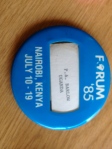I did not know that the African Union had made 2010 – 2020 the African Women’s decade – but they did! Was there any media hype about it? Did I miss it, in the noise and media overload of this century? Or was I just too tied up in taking care of my little 6 month old, who was just coming out of his premature stage and becoming stronger? I don’t know, and I don’t think that really matters – not really… it’s just that the concept of the ‘African Women’s Decade’ gives me a sense of excitement and possibility, and a sense of deja-vu. It takes me back to Nairobi in July 1985 when Kenya hosted the U.N.’s 3rd World Conference on Women to ‘review and appraise the achievement of the UN Decade for Women’ (1975 – 85). I was 21 years old and through some luck my friend Irene was able to get us to work as volunteers at the NGO Forum – see my badge!!! 😉 (P.A. Barlow) It felt like such a privilege.
To be honest I do not remember much about that time – except that it was very exciting, and the Forum was based around the National Theatre. There were so many women in Nairobi – and the men, who had been excited about the prospect of being surrounded by many women ended up frustrated because all the women were interested in was Women’s issues!!! Another thing I remember that a group of us, young black women went to the Hilton Hotel (unaccompanied by any man) and they did not treat us like we were hookers, AND we had quick service!!! And all the street children disappeared from the streets of Nairobi for a time.
A lot was achieved, I am sure, – and a lot of decisions and strategies developed in the UN, Development agencies, Governments etc – but I want to know what impact it had on the ordinary woman. Conferences often frustrate me because you spend most of you time listening to people talking AT you, and the most interesting encounters, for me, are the conversations you have over tea, or lunch, or when you are looking at the displays, and accidentally bump into someone. I wish there were more spaces for people to engage – not just to ask questions of the speakers, but to sit and really engage, dream, plan, listen to each others stories, understand the different contexts….
You see I am more interested in the impact on people, rather than policy, and so on. Policy creates an enabling environment, but if no one acts then its just words on paper. I fight for women, but sometimes hard-nosed feminists turn me off. I get frustrated when they paint all men with one brush (evil, pulling women down) and I reflect and realise that my mother would not have gone to University in the 1950s if it had not been for the foresight of her father. Or when I can identify a number of women who pulled me back, and men who encouraged me. I get frustrated when they speak of the patriarchical society, and then go on to behave in exactly the same way that they say men do – and thus silence all the women they are claiming to empower! Women, like men, are just human beings with strengths and weaknesses.
So while the idea of a women’s decade excites me, I want to approach it differently from the way it seems to come up in the mainstream. I would like to be more awake than I was at 21, and, in some small way make this decade count in more than just words – or policies or projects looking for funders (all of which are absolutely important – I know that). The question I am asking myself, and you, is ‘What are you going to do to make this decade of the African Women more than just words on paper – or people shouting in the political arena about what is not happening? What mark will we leave – beyond the rhetoric and the hype – even if it touches just one person?
- How will we define (or re-define) power, and powerful women? Will it be all about money and business, or being senior in government? Or will we recognise all the ways in which women support the continent?
- What, in your deepest heart of hearts, do you want to be the legacy of this decade? How can you contribute, in a new and innovative way – beyond the tried and tested ‘recipes’ that often do not touch the ordinary woman?
- Who are we going to celebrate? Whose stories will we share? Will we celebrate that woman who makes sure (on her meagre earnings) her children have a safe place to sleep, a roof over their heads, and get an education as well as that woman who goes out and fights for policies and infrastructure, or who makes an impact in the field of Education, or in the Economy? Or we going to focus on the ‘celebrities’?
- Will we be able to go beyond the traditions that trap women, and recognise, also the ways in which women make those traditions work for them (check out this video – http://www.ted.com/talks/kavita_ramdas_radical_women_embracing_tradition.html)
How about starting by recognising your 10 most inspiring /powerful/amazing African women? Lets talk about them! Send me a short email, and a photo, if you have one, and I will add them all to my blog.
As a starting point (and before I put my 10 most inspiring African women down) let me share this with you :
http://www.forbes.com/sites/mfonobongnsehe/2012/12/06/the-20-youngest-power-women-in-africa-2012/

Pippa thank you so much! Will be sending you feedback! God Bless all your endeavours!